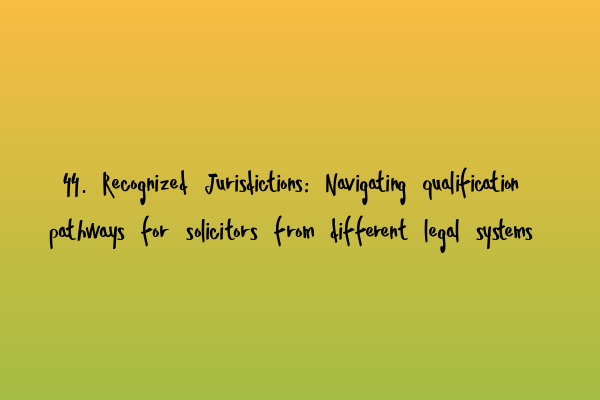44. Recognized Jurisdictions: Navigating qualification pathways for solicitors from different legal systems
When it comes to becoming a solicitor, there are many qualification pathways for individuals from different legal systems. Recognized jurisdictions play a crucial role in determining the eligibility of individuals to practice law in certain countries.
In this article, we will explore the concept of recognized jurisdictions, understand the challenges faced by solicitors from different legal systems, and discuss how to navigate the qualification pathways to become a solicitor in a new jurisdiction.
Understanding Recognized Jurisdictions
A recognized jurisdiction refers to a country or legal system whose qualifications for solicitors are acknowledged and accepted by another jurisdiction. It allows individuals who have completed their legal education and training in one jurisdiction to gain recognition in another, facilitating the practice of law across borders.
For example, the Solicitors Qualifying Examination (SQE) in the United Kingdom is open to individuals from recognized jurisdictions, enabling them to qualify as solicitors in England and Wales without having to start from scratch.
Challenges Faced by Solicitors from Different Legal Systems
While the concept of recognized jurisdictions facilitates the mobility of solicitors, there are challenges that individuals from different legal systems may face when seeking qualification in a new jurisdiction.
One of the main challenges is the difference in legal systems and legal education structures. Each legal system has its own unique set of laws, procedures, and ethical considerations. Solicitors from a different legal system often need to familiarize themselves with these differences and undergo additional training or assessment to ensure they meet the requirements of the new jurisdiction.
Additionally, language barriers and cultural differences can also pose challenges. Effective communication and understanding of local legal practices are essential for solicitors to succeed in a new jurisdiction.
Navigating the Qualification Pathways
To navigate the qualification pathways for solicitors from different legal systems, individuals need to follow certain steps and fulfill specific requirements. Here are some key considerations:
- Evaluate Eligibility: Determine if your legal system is recognized by the jurisdiction you wish to practice in. Check the eligibility criteria for qualification and ensure you meet the necessary qualifications and experience requirements.
- Language Proficiency: Enhance your language skills, particularly if the new jurisdiction requires proficiency in a different language. Strong verbal and written communication skills are essential for success as a solicitor.
- Educational Equivalence: Assess the equivalence of your legal education and training in the new jurisdiction. Some jurisdictions may require additional exams or assessments to evaluate your knowledge and competence.
- Continuing Professional Development: Stay updated with the legal developments and requirements of the new jurisdiction. Participate in relevant courses, seminars, and workshops to enhance your knowledge and skills.
- Seek Guidance: Consult with professionals who specialize in international qualifications and admissions, as they can provide valuable guidance and support throughout the qualification process.
Remember that navigating the qualification pathways can be complex, but with dedication, perseverance, and a thorough understanding of the requirements, you can successfully qualify as a solicitor in a new jurisdiction.
For further resources and support in preparing for the solicitors qualifying examination, check out these related articles:
- Conquer the Multiple Choice Questions (MCQ) in SQE1
- Interactive mock tests for SQE: Enhancing engagement and learning
- SQE Sample Papers: Practice for Exam Success
- Focus Areas in SQE1 and SQE2: Mastering Key Concepts
- Adjusting Your SQE Strategy Based on Mock Performance
By utilizing these resources and staying focused on your goal, you can overcome the challenges and embark on a successful career as a solicitor in a new jurisdiction.
DISCLAIMER: This article is for informational purposes only and should not be construed as legal advice. Please consult with a qualified legal professional for advice specific to your situation.
